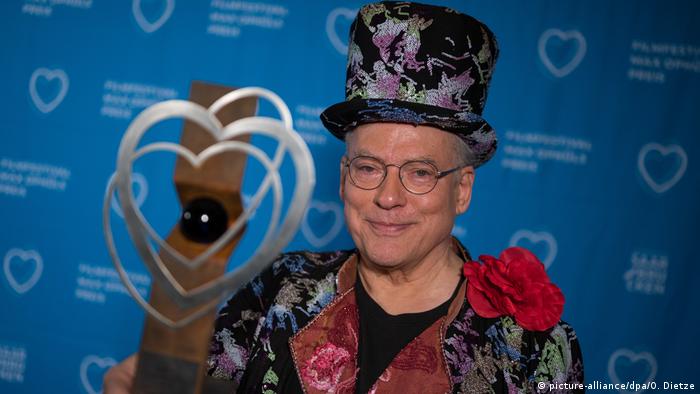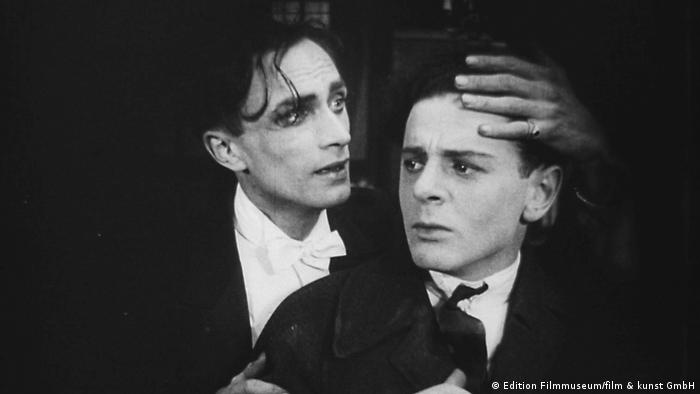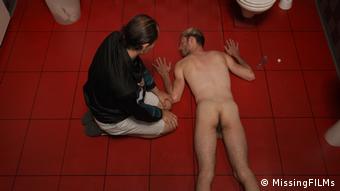Rosa von Praunheim: Germany's controversial 'gay film director'
The prolific filmmaker recently received a lifetime achievement award for more than 50 years of taboo-breaking movies largely centered on LGBTQ themes. After 150 films, his unconventional art is set to go on

When Rosa von Praunheim recently received the Saarbrücken Filmfestival Max Ophüls Preis for Lifetime Achievement, he mockingly described it as a kind of "death Oscar."
Having been recognized at Germany's preeminent festival for young filmmakers, the 77-year-old director showed off the self-deprecating wit that has marked his 50-year career of one of Germany's gay cinema pioneers.
150 films and counting
Widely recognized as Germany's best-known "gay film director," von Praunheim sees the moniker as a badge of honor: "I think that worldwide I am the one who has made the most films on gay subjects," he said, adding that his work has covered the gamut of gay, lesbian and trans subjects. He's proud of the roughly 150 films he's made, he says.
Von Praumheim was born Holger Radtke in 1942 in a prison in Riga, Latvia. His mother died shortly after the end of the war in a Berlin sanatorium. He was adopted, which he only discovered in 2000, and he only learned of the fate of his biological mother at age 64. She has been a subject in his films, along with many other aspects of his personal life.
He took on the name "Rosa" (pink in German) as a reminder of the pink triangle that the Nazis forced homosexuals to wear in the concentration camps. "Praunheim" refers to a district in Frankfurt where the director once lived.
Filmmaking was not von Praunheim's first passion, he told DW: "I studied painting, and I still paint, I still do exhibitions, that's a mainstay. I wrote, and I'm still writing. I like writing poems. I'm working on a novel, I write plays. Film joined the picture at some point.
100 YEARS OF HOMOSEXUALITY IN FILM
Different from the Others (1919)
Considered the very first film on homosexuality, "Different from the Others" was directed by Richard Oswald, who urged dropping Germany's Article 175, which made homosexuality a criminal offense. Pandemonium broke out at the film's premiere in a Berlin movie theater in 1919, but it wasn't prohibited because film censorship didn't yet exist. Article 175 was repealed decades later — in 1994
BREAKING TABOOS
He first became known as an emerging director in the early 1970s, and he soon became the most important gay filmmaker in Germany next to Rainer Werner Fassbinder. From early on, the subject of homosexuality featured prominently in his artistic work, even more so than in Fassbinder's.
The film Nicht der Homosexuelle ist pervers, sondern die Situation, in der er lebt ("It Is Not the Homosexual Who is Perverse, but the Society in Which He Lives") from 1971, about a gay man from the provinces who struggles to find sexual liberation in Berlin, marked a new beginning not only for German cinema, but for the gay rights movement in the country. The New York Times called the film "a militantly Marxist call for a end to homosexual oppression."

'It Is Not the Homosexual Who Is Perverse, But the Society in Which He Lives': the title says it all
In the period after the social upheavals of 1968, von Praunheim brought the subject of homosexuality into the mainstream in an unconventional way that upended taboos. He called on gay men to "get out of the restrooms and onto the streets!" and to publicly reveal their sexuality. While a large section of conservative society expressed reservations, von Praunheim became an emblem for the scores of gay rights groups that were subsequently formed in West Germany.
Advice for young filmmakers
At the Max Ophüls Preis film festival, von Praunheim not only received the lifetime achievement award but also gave a master class for a rising generation of young filmmakers. He is actively engaged in teaching activities both abroad and at home, where he is a professor in directing at the Film University Babelsberg.
What does he believe is essential to succeed as a director today? "Discipline is part of it, of course, and that you passionately back what you do," von Praunheim said. "It doesn't happen by itself. You can't just sit there and then become famous. You have to be constantly engaged with the medium, have fun shooting and let your imagination run free."
But he also cautions young filmmakers that things have changed since he came of age as a filmmaker in the 1970s and 80s, saying that everything today had to be "much more audience-friendly." For filmmakers, that's "a big hurdle, because you can't experiment in the same way anymore."

Saarbrücken festival director Svenja Böttger, Rosa von Praunheim and his husband Oliver Sechting (L to R)
From strong women to gay serial killers
Alongside the exploration of homosexuality, von Praunheim's films often portray strong women.
"For a gay man, working with strong women is a strong identification. It's easy to put yourself in their shoes," he explains. He adds that these women have greater freedom through clothing and makeup and more ability to express their feelings than men are typically permitted by society. "With men, I was always a bit scared, boozing, football and war games and stuff," he said. But he believes that this has changed, "because the image of men itself has also changed," he explains.
The director's latest film, Darkroom: Drops of Death, is a dark drama in which a gay serial killer targets gay men with his deadly poison. Once again, von Praunheim is breaking taboos: "After 50 years of emancipation you can afford to show a so-called bad gay guy."
Even at 77, retirement hasn't crossed the mind of von Praunheim. Filmmaking, writing, painting — all are included in a full list of plans and projects. He sees the lifetime achievement award only as a stopover.
DW RECOMMENDS
Is the Eurovision Song Contest too 'gay' for Hungary?
Hungary has pulled out of the 2020 Eurovision Song Contest that will take place in Rotterdam. No reason was given, but many people are speculating that the decision is related to the government's homophobic stance. (29.11.2019)
Uganda introduces 'Kill the Gays' bill
Ugandan lawmakers have re-introduced a bill that could impose the death penalty for gay sex acts. The proposed bill will also criminalize the "promotion and recruitment" of homosexuality. (11.10.2019)
Scotland to pardon men convicted under homophobic laws
The move follows a 2018 measure passed by Parliament to clear the records of all men who were convicted for homosexuality. Scotland's pardon law is wider in scope than that of England and Wales. (15.10.2019)


No comments:
Post a Comment